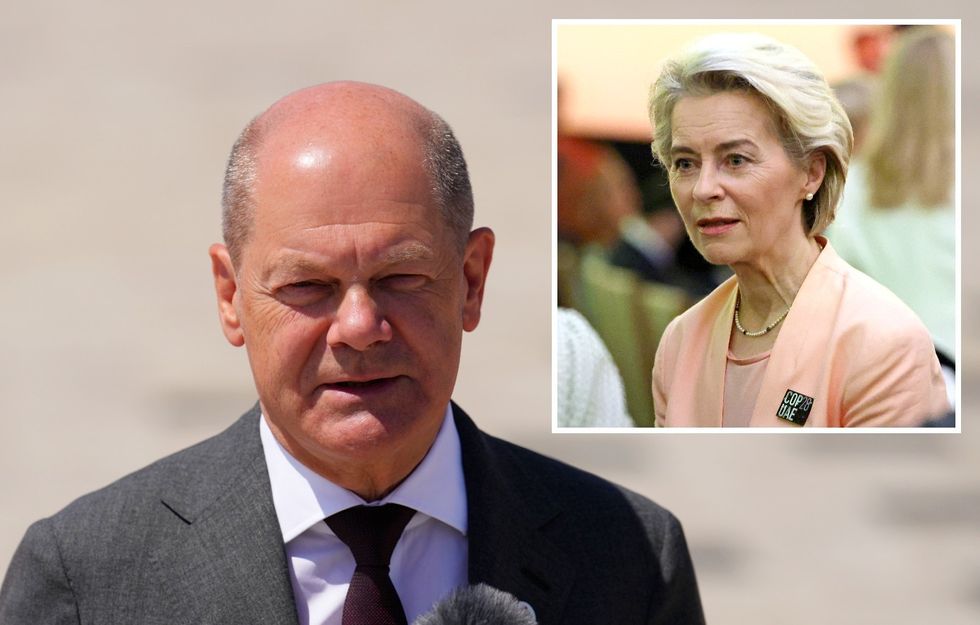In this members-only feature piece, GB News takes a deep dive into exactly what is behind the rise of anti-EU sentiment in Ursula Von der Leyen's home country - and what it means for the Brussels
Don't Miss
Most Read
Trending on GB News
The Eurosceptic movement in Germany is growing on both sides of the political spectrum. Right-wing party Alternative for Germany (AfD) has gained significant amounts of attention for its impressive poll rankings, hitting an all-time high of 23 per cent in a poll last month. The populist, anti-immigration and, notably, eurosceptic party has a growing appeal to voters.
But it's not just hard right in Germany that is campaigning on an anti-Brussels platform. The newly formed Sahra Wagenknecht Alliance (BSW) is an economically left-wing group, which promotes a few significant socially right-wing policies.
Founded by prominent German left-wing politician Sahra Wagenknecht, the group advocates high taxes on the rich and high pensions - alongside a markedly anti-immigration message. And worryingly for the EU, like the AfD, BSW also promotes Euroscepticism.
The group aims to provide a left-wing alternative to the AfD, whilst still appealing to wider dissatisfaction with the current system.

The Eurosceptic movement in Germany is growing on both sides of the political spectrum
PA
Launched just last month, it is too soon to tell how much of an impact the BSW will make. But there is no doubt that a left-wing alternative to the increasingly popular AfD - which shares the same anti-immigration stance - is not a positive development for Olaf Scholz or lawmakers in the EU.
What the two groups share, aside from a scepticism of Brussels, is a belief that the current system is not working.
Speaking at BSW's founding congress in Berlin, Wagenknecht said: "We are setting out to change politics in Germany". She said that German voters are now overcome with "insecurity, outrage and fury", vowing to offer an alternative.
Meanwhile, an AfD insider told GB News that the group is about "offering something which hasn't been a real option for [voters] in a long time".
Germany is certainly not alone in seeing eurosceptic parties pop up across the country. France, Austria, Hungary, and Italy are all seeing similar trends.
A recent report by the European Council on Foreign Relations think tank has warned that Eurosceptic parties are on course to win in nine member states at the European Parliament elections in June. Nine other countries will see anti-EU parties come second or third.
But there is something particularly significant about Germany - the largest economy in Europe and typically one of the EU's most loyal member states - seeing growing support for anti-Brussels parties.
But why are these parties gaining so much support in the first place?
Themistoklis Asthenidis, the former Political Director of the European Conservatives and Reformists Party (ECR), said that Euroscepticism cannot be explained by a one-size-fits-all justification.
"It has been growing in Europe since at least 2011, 2012 - in each country for different reasons. It's not directly related to a political persuasion, like left or right. You see Podemos and Vox in Spain, on the left and the right, both eurosceptic", he said.
Asthenidis continued: "There are a number of factors that have seen Euroscepticism grow. It’s migration, economic crises such as what happened in the Eurozone, attacks on social institutions".
In Hungary and Poland, he said, there is growing anger towards the EU over how they have been treated by the bloc - referring to accusations of blackmail levelled at Von der Leyen after she threatened Orban's administration with economic sanctions if it did not fall in line over support for Ukraine.
"They just think, we don't want to be treated like that", he said.
Speaking about support for Euroscepticism in Germany, the AfD insider said there is growing frustration at the current administration, led by Olaf Scholz, and a sense that "nothing is being done" to tackle issues voters truly care about, such as migration.
"People [think] the Government is pandering to what the EU wants... and ignoring their concerns", they added.
Polling published earlier this year suggests that as many as 54 per cent of voters have little faith in German democracy. A meagre nine per cent trust political parties in general.
Just 27 per cent of people feel confident that the state is able to do its job well, while 69 per cent say it is currently overwhelmed.
German chancellor Olaf Scholz's approval ratings are plummeting too. He is now facing the lowest approval ratings of any modern German leader, with his Social Democratic party (SPD) having fallen to 13 per cent in the polls.
Between them, the three parties in Scholz’s ruling coalition — the SPD, the Greens and the Free Democrats (FDP) — can barely reach 30 per cent approval.
MORE CONTENT FOR GBN MEMBERS:
The European Parliament will go to the polls in June, and it will be symbolically unnerving for Ursula Von der Leyen if the growth in Eurosceptic parties that is expected comes true.
While a boost in the number of MEPs from parties like the AfD and BSW will not shift Germany's overall position towards the EU, as that is decided at a national level, a large number of eurosceptic MEPs would certainly cause problems for Von der Leyen.
Asthenidis said a boost in numbers may not allow them to actively impact the nation's overall stance towards the EU, but it would, he said, allow them to be "disruptors", voting down legislation in the European Parliament.
He explained: "It’s a national government that takes decisions on policy with the EU. So even with huge numbers at the EU parliament, it's unlikely that they could impact overall policy direction or influence national vetoes. It is the national Government that approves legislation at the European Parliament... But that said, they can be disruptors."
Asthenidis predicts the AfD will be the second-largest party in the European Parliament following the elections this summer.
You may like






